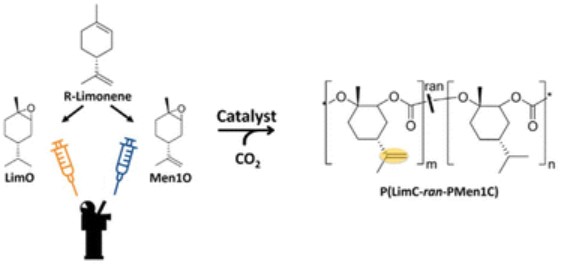News
Bio-based, random terpolymers with defined functionality based on poly(limonene carbonate-ran-menth-1-ene carbonate)
16.04.2024
Marcel Höferth, Holger Schmalz, Andreas Greiner
Polym. Chem., 2024, https://doi.org/10.1039/D3PY01331F
The increasing shortage in fossil resources creates a strong demand for the development of bio-based polymers with tailored properties, not competing with food resources. Polycarbonates, produced by ring-opening copolymerization (ROCOP) of epoxides and CO2, are one promising material class to solve this issue. Poly(limonene carbonate) (PLimC) is a bio-based and non-food based polycarbonate made from limonene oxide (LimO) and CO2. It features an exocyclic double bond at each repeating unit, which can be utilized for further functionalization reactions. However, the degree of functionalization is hardly controllable. Here, we demonstrate that random terpolymerization of LimO with its hydrogenated analogue menth-1-ene oxide (Men1O) and CO2 gives access to polycarbonates with a defined number and homogeneous distribution of functional groups within the polymer chain. The reactivity ratios, determined by the Fineman-Ross and non-linear least square (NLLS) methods, are close to 1.0 for both LimO and Men1O, proving the random nature of the terpolymerization. The versatility of this synthetic platform is shown by thiol–ene click functionalization with 2-mercaptoethanol, yielding terpolymers with a defined number of pendant hydroxy groups. These are exemplarily used for fluorescence labelling of solution cast films with 5-fluorescein isothiocyanate (FITC), revealing a high accessibility of the pendant hydroxy groups for further reactions, even in heterogeneous systems.


